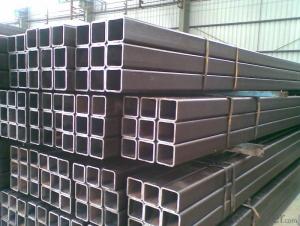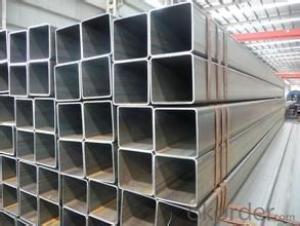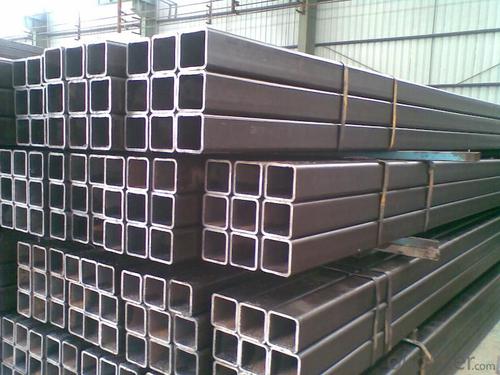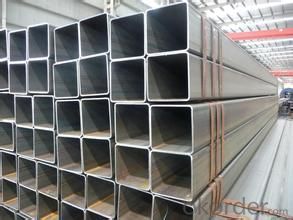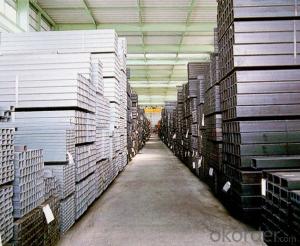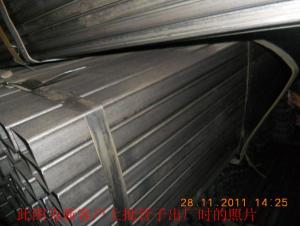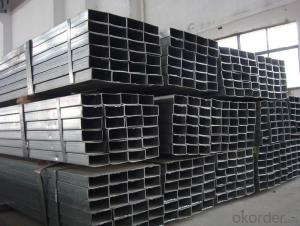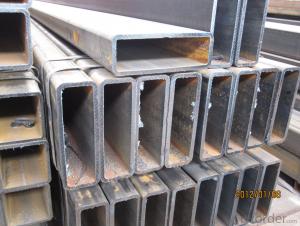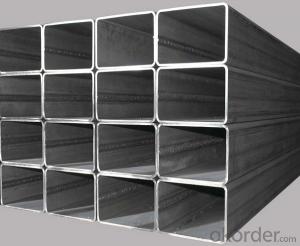Hollow Section Steel Pipe Various Size Good Quality
- Loading Port:
- Tianjin
- Payment Terms:
- TT or LC
- Min Order Qty:
- 25 m.t.
- Supply Capability:
- 10000 m.t./month
OKorder Service Pledge
OKorder Financial Service
You Might Also Like
1、Structure of Hollow Section Steel Pipe Various Size:
To be used for construction, furniture structures as well as other fabrication purposes.
2、Main Features of Hollow Section Steel Pipe Various Size:
• High manufacturing accuracy
• High strength
• Small inertia resistance
• Strong heat dissipation ability
• Good visual effect
• Reasonable price
3、Hollow Section Steel Pipe Various Size Specification:
Standard | ASTM A500, GB6728 |
Grade | A, B, C, Q195, Q235, Q215 |
Thickness | 0.6-10MM |
Section Shape | Square |
Outer Diameter | 10*10-500*500 |
Place of Origin | TIANJIN, China (Mainland) |
Secondary Or Not | Non-secondary |
Application | Hydraulic Pipe |
Technique | HOT-ROLLED |
Certification | CO, MTC, CI, PL |
Surface Treatment | factory state or painted black |
Special Pipe | |
Alloy Or Not | Non-alloy |
Length | 5-12M |
Outer Diameter | 10*10-500*500 |
1) Material: A, B, C, Q195, Q235, Q215
2) Specification range: 10*10-500*500 WT:0.6-10MM ,length:6-12m or according to the requirement of clients.
3) Excutive standards:GB,ASME API5L.ASTM A 106/A53,Despite of the above standards,we can also supply seamless steel pipe with standard of DIN,JIS,and so on,and also develop new products according to the requirements of our clients!
4) Surface:black lacquered,varnish coating or galvanized.
5) Ends:Beveled or square cut,plastic capped,painted.
6) Packing:bundles wrapped with strong steel strip,seaworthy packing.
4、Packaging & Delivery
Packaging Details: | seaworthy package,bundles wrapped with strong steel strip |
Delivery Detail: | 15-30days after received 30%TT |
5、FAQ of Hollow Section Steel Pipe Various Size:
①How is the quality of your products?
Our products are manufactured strictly according to national and internaional standard, and we take a test
on every pipe before delivered out. If you want see our quality certifications and all kinds of testing report, please just ask us for it.
Guaranteed: If products’ quality don’t accord to discription as we give or the promise before you place order, we promise 100% refund.
②How about price?
Yes, we are factory and be able to give you lowest price below market one, and we have a policy that “ for saving time and absolutely honest business attitude, we quote as lowest as possible for any customer, and discount can be given according to quantity”,if you like bargain and factory price is not low enough as you think, just don’t waste your time.Please trust the quotation we would give you, it is professional one.
6、Hollow Section Steel Pipe Various Size Images:
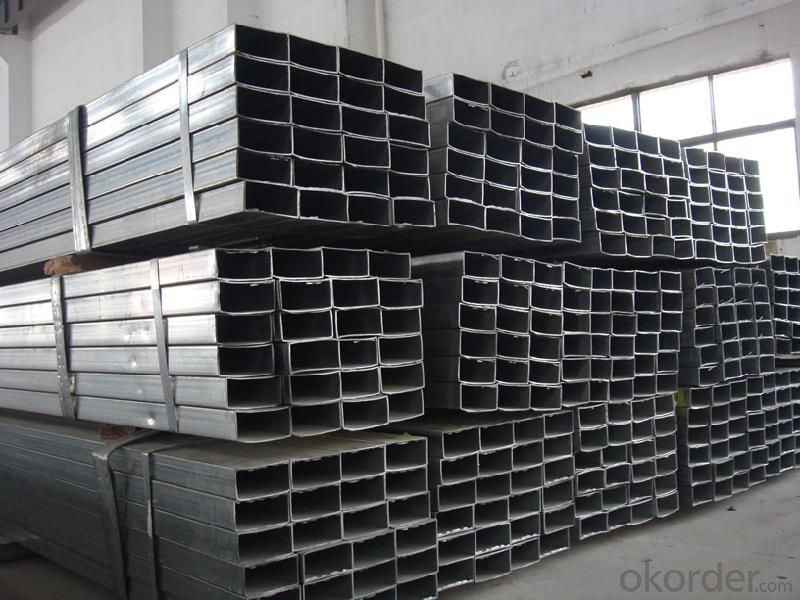
- Q: Can steel pipes be recycled?
- Yes, steel pipes can be recycled. Steel is a highly recyclable material, and the recycling process for steel pipes involves melting them down to create new steel products. Recycling steel pipes not only conserves natural resources but also reduces energy consumption and carbon emissions associated with the production of new steel.
- Q: What are the different types of steel pipe coatings for nuclear power plants?
- There are several different types of steel pipe coatings used in nuclear power plants. These include epoxy coatings, fusion bond epoxy (FBE) coatings, polyethylene (PE) coatings, and coal tar enamel (CTE) coatings. Each coating has its own specific properties and advantages, such as corrosion resistance, chemical resistance, and abrasion resistance, to ensure the durability and longevity of the steel pipes in the demanding nuclear power plant environment.
- Q: What is the average lead time for manufacturing steel pipes?
- The average lead time for manufacturing steel pipes can vary depending on several factors such as the complexity of the design, size of the order, and the specific production capabilities of the manufacturer. Typically, it can range from a few weeks to a few months.
- Q: What are the common materials used for pipe fittings in steel pipes?
- The common materials used for pipe fittings in steel pipes are carbon steel, stainless steel, and ductile iron.
- Q: What is the difference between hot-dip galvanizing and electroplating for steel pipes?
- Hot-dip galvanizing and electroplating are two common methods used to provide corrosion protection for steel pipes, but there are key differences between the two processes. Hot-dip galvanizing involves immersing the steel pipes into a bath of molten zinc, which forms a metallurgical bond with the steel. This results in a thick and durable zinc coating that provides excellent corrosion resistance. The process of hot-dip galvanizing creates a uniform coating that covers the entire surface of the steel pipe, including both the external and internal surfaces. This makes hot-dip galvanizing particularly effective for protecting both the inside and outside of the pipes. On the other hand, electroplating is a process that involves the deposition of a thin layer of metal onto the surface of the steel pipes using an electric current. In the case of electroplating for steel pipes, typically a layer of zinc is applied. Unlike hot-dip galvanizing, electroplating does not provide a metallurgical bond between the zinc and the steel. Instead, it creates a mechanical bond, which is not as strong or durable as the bond formed through hot-dip galvanizing. The electroplated zinc layer is thinner compared to hot-dip galvanizing, which means it may not provide the same level of corrosion protection. Another difference between hot-dip galvanizing and electroplating is the application process. Hot-dip galvanizing requires immersing the steel pipes into a bath of molten zinc, which can be a time-consuming process. Electroplating, on the other hand, involves applying the zinc coating through an electrolytic cell, which can be faster and more efficient. In summary, the main difference between hot-dip galvanizing and electroplating for steel pipes lies in the thickness and durability of the coating, as well as the bonding mechanism between the zinc and the steel. Hot-dip galvanizing provides a thicker and more durable coating with a metallurgical bond, making it more effective for long-term corrosion protection. Electroplating, on the other hand, creates a thinner coating with a mechanical bond, which may be suitable for applications requiring a less robust level of corrosion resistance.
- Q: Can steel pipes be used for culvert applications?
- Yes, steel pipes can be used for culvert applications. Steel pipes are commonly used for culverts due to their durability, strength, and resistance to corrosion. They can withstand heavy loads and are able to handle high traffic volumes and large water flows. Additionally, steel pipes can be easily manufactured in various sizes and shapes to suit specific culvert requirements. Their longevity and low maintenance needs make them a cost-effective choice for culvert applications.
- Q: How are steel pipes insulated to prevent condensation?
- Steel pipes are typically insulated using materials such as foam or fiberglass wraps, which act as a barrier between the cold pipe surface and the surrounding air. This insulation prevents the formation of condensation by reducing heat transfer and maintaining the pipe temperature above the dew point of the air.
- Q: Can steel pipes be painted?
- Yes, steel pipes can be painted. Painting steel pipes not only enhances their appearance but also provides protection against corrosion and rust. The process typically involves cleaning the pipes thoroughly, applying a primer, and then coating them with a suitable paint.
- Q: Can the KBG25 steel tube hold 4 six types of cables?
- 1 of the six lines of cross-sectional area of about 25 square millimeters, 4 to 100 flat, KBG25 cross-sectional area of about 490100/490=20.4%, just over the specifications, so short distance and less elbow can be worn. However, due to the construction of pipes are generally not standardized, elbow more, and do not use special elbow (site bending), so KBG25 wearing 4, six kinds of cable are more difficult.
- Q: What are the different methods of wrapping steel pipes for corrosion protection?
- Corrosion protection for steel pipes can be achieved through various methods, tailored to specific applications and environmental conditions. Some commonly used techniques include: 1. Tape Wrapping: Steel pipes are wrapped with corrosion-resistant tape, like polyethylene or polypropylene tape, to create a barrier between the pipe and corrosive elements. This reduces the risk of direct contact and subsequent corrosion. 2. Inner Wrapping: A protective coating or lining is applied to the inside surface of the steel pipe. This method is commonly employed for pipes transporting fluids or gases, offering an additional layer of protection against internal corrosion. 3. External Coating: A widely utilized technique involves applying a protective coating to the outer surface of the steel pipe. This coating, which can consist of materials like epoxy, polyethylene, or polyurethane, acts as a barrier against corrosive elements, extending the pipe's lifespan. 4. Cathodic Protection: An electrochemical method is utilized to safeguard steel pipes from corrosion. By connecting the steel pipe to a sacrificial anode, such as zinc or magnesium, the anode corrodes instead of the pipe. This diverts corrosive currents away from the pipe, preventing its corrosion. 5. Heat Shrink Sleeve: Heat shrink sleeves are commonly employed for corrosion protection in underground or submerged scenarios. These sleeves, made of heat-activated material, shrink when heated to form a tight seal around the pipe. By preventing direct contact with moisture and corrosive elements, the sleeve effectively acts as a barrier. 6. Fusion Bonded Epoxy (FBE) Coating: FBE coating entails applying a thermosetting powder coating to the steel pipe's surface, which then fuses to create a protective layer. This coating exhibits strong adhesion and corrosion resistance, making it a popular choice for various steel pipe applications. Choosing the appropriate corrosion protection method for steel pipes depends on factors like the environment, specific corrosive elements, intended use, and other requirements. Seeking professional advice and consultation may be necessary to determine the most suitable technique for a particular situation.
Send your message to us
Hollow Section Steel Pipe Various Size Good Quality
- Loading Port:
- Tianjin
- Payment Terms:
- TT or LC
- Min Order Qty:
- 25 m.t.
- Supply Capability:
- 10000 m.t./month
OKorder Service Pledge
OKorder Financial Service
Similar products
Hot products
Hot Searches
Related keywords
